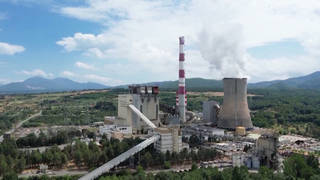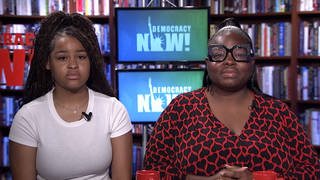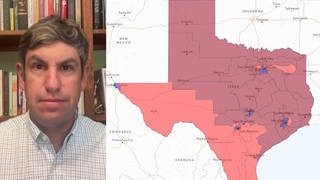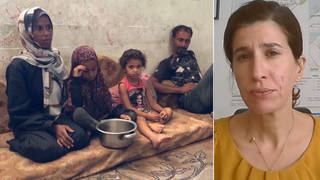
Topics
In the latest assault on media workers in Iraq, U.S. forces shoot dead a Reuters new agency soundman and order a Reuters cameraman to be held without charge for six months in Abu Ghraib. We host a debate with David Schlesinger, Global Managing Editor of the Reuters News Agency and Lt. Col. Steven Boylan, spokesperson for the U.S. military in Iraq and Director of Combined Press Information Center. [includes rush transcript]
A cameraman for Reuters in Iraq has been ordered by a secret tribunal to be held without charge in Abu Ghraib prison until his case is reviewed within six months.
Ali Omar Abrahem al-Mashhadani was arrested by U.S. forces on August 8 after a search of his home in the city of Ramadi. The U.S. military has so far refused Reuters requests to disclose why he is being held. He has not been charged.
U.S. military spokesperson Major General Rick Lynch responded to questions from journalists about the detention of Ali al-Mashhadani.
- Maj. Gen. Rick Lynch, U.S. military spokesperson.
Meanwhile, journalists’ organizations have called for the immediate release of Mashhadani.
- Ismael Zayer, chairman of the Iraqi Union of Journalists.
The news of al-Mashhadani’s detention comes just three days after U.S. forces in Iraq shot dead a Reuters new agency soundman. On Sunday, Whaleed Khaled died of several bullet wounds to the head and chest. He was shot while on assignment covering the killing of two policemen in Hay al-Adil. Cameraperson Haider Khadem was also wounded in the attack and then detained by U.S. troops for questioning.
As many as 67 journalists and media workers have been killed in Iraq since the U.S. invasion began in March 2003. Two Reuters camera people have been killed by U.S. troops in Iraq since the U.S. invasion in 2003. A third was shot dead by a sniper in Ramadi last November in circumstances for which Reuters is still seeking an explanation from U.S. forces.
U.S. ambassador to Iraq Zalmay Khalilzad responded to the killing of Whaleed Khaled on Tuesday.
- Zalmay Khalilzad, U.S. ambassador to Iraq.
We host a debate with the Global Managing Editor of Reuters and spokesperson for the U.S. military in Iraq.
- David Schlesinger Global Managing Editor of the Reuters News Agency.
- Lt. Col. Steven Boylan, spokesperson for the U.S. military in Iraq and Director of Combined Press Information Center.
Transcript
AMY GOODMAN: U.S. military spokesperson, Major General Rick Lynch, responded to questions from journalists about the detention of Ali al-Mashhadani.
MAJ. GEN. RICK LYNCH: We don’t arbitrarily detain individuals across Iraq regardless of what your profession is. If they’re conducting an act that is suspicious that we believe is tied to the insurgency, we have the authorities to detain that individual and then put him into the process that I have articulated.
REPORTER: But journalist is a special profession in this case. Are you recognizing that that is a special case?
MAJ. GEN. RICK LYNCH: Well, what we have do is look at the individual that was indeed detained, and what was he doing, regardless of what his profession was.
REPORTER: So that’s no?
MAJ. GEN. RICK LYNCH: That’s no.
AMY GOODMAN: Meanwhile, journalist organizations are calling for the immediate release of Mashhadani. This is the Ismael Zayer, chair of the Iraqi Union of Journalists.
ISMAEL ZAYER: This is unacceptable. The arrest of our colleague for 50 days plus is something have no answer, no question, no explanation and no reason. We cannot accept it as an Iraqi Union of Journalists, and as a professional journalist working on the ground. We cannot accept the way the American forces, military forces, behave toward Iraqi journalists.
AMY GOODMAN: The news of Al-Mashhadani’s detention comes just three days after U.S. forces in Iraq shot dead a Reuters news agency soundman. On Sunday, Whaleed Khaled died of several bullet wounds to the head and chest. He was shot on while on assignment covering the killing of two policemen in Hay al-Adil. Cameraperson Haider Khadem was also wounded in the attack and then detained by U.S. troops for questioning. Between 52 and 67 journalists and media workers have been killed in Iraq since the U.S. invasion began in March 2003. Two Reuters camera people have been killed by U.S. troops there since the invasion. A third was shot dead by a sniper in Ramadi last November in circumstances for which Reuters is seeking an explanation from US Forces. US Ambassador to Iraq, Zalmay Khalilzad, responded to the killing of Whaleed Khaled on Tuesday.
REPORTER: In Iraq do they have a “shoot first, ask questions later” policy? We need some clarification.
ZALMAY KHALILZAD: Well, of course, we think the freedom of the press is critical for building a democratic order. And that’s why we encouraged in the draft of the Iraqi constitution that that right, that reality, that recognition be enshrined. As I said before, we will investigate. I don’t know what you mean that there is a lack of cooperation. We’ll investigate, and when the results of the investigation are produced, when the investigation is completed, we will let you know, and we’ll let everyone else know what happened, and we’ll draw the right lessons from it, and say what needs to be said after the investigation is completed.
AMY GOODMAN: We’re joined now from London by David Schlesinger, the Global Managing Editor of Reuters News Agency, and on the line from Baghdad, Lieutenant Colonel Steven Boylan, spokesperson for the U.S. military in Iraq. Let’s begin with David Schlesinger. Can you talk about the death of your soundman and the detention of the man who was with him, as well as another Reuters journalist?
DAVID SCHLESINGER: Right. Well, the one piece of good news I can tell you is that I have just had confirmation that Haider Khadem has been released to Reuters, which is very good. In fact, it was really extraordinary that he was being held, though wounded and though his companion had been shot, that he had been held for so long, but he was just released. I got the news about ten minutes ago. So we’re getting him treated in Baghdad, and, of course, we will want to hear his story of what happened.
My sense is that you gave a very good introduction to some of the problems that we’re facing in Iraq. We have had now four people die while covering the war, and they’re among, as you said, an extraordinary number of journalists who have been killed during this conflict, and now there are probably five or so journalists who are being held for other inexplicable reasons. And all this has made it an extremely difficult conflict to cover, and yet it’s clearly a vital conflict to cover. The role of journalists has never been more important because there’s global interest in the story, it’s an important country. It’s a country where horrible things are happening, like the stampede today. That wouldn’t be known to the world unless there were journalists who are brave enough willing to cover the story.
And yet, if they can be killed on sight, if they can be detained for reasons that are not made public, if there can be secret tribunals where journalists cannot even have the benefit of their own counsel, let alone have the charges against them made known to their employers or family, that makes it extremely difficult to cover the story and makes Iraq one of the more extraordinary and difficult countries in the world for journalists to operate in today.
AMY GOODMAN: Lieutenant Colonel Steven Boylan can you respond to the killing of Reuters soundman, as well as to the detention of the two others?
LT. COL. STEVEN BOYLAN: Well, that is still under an ongoing investigation. We cannot or we normally do not also comment on ongoing investigations other than that. That is our standard practice, has been our standard practice and will continue to be our standard practice.
The detention of the cameraman was at the scene, based on the circumstances surrounding what was happening. He was detained further because his answers to questions that he was being asked were inconsistent with the previous answers he had given. So that warranted further questioning. That is the extent of that.
I understand that he was to be released today, and I’m glad to hear that he has been released. Nobody is doubting the bravery or the dedication of any journalist here in Iraq covering a war. A war is a dangerous place to cover, not only for the journalists but the Iraqi civilians that live here and the service members from all of the coalition countries that are serving here. It is a unique area to cover, because of the type of conflict that it is. The terrorists and insurgents here are using tactics similar to what the media would use to cover stories as a way to infiltrate areas, and so that puts an added burden on everyone on how to cover the story.
AMY GOODMAN: Lieutenant Colonel Boylan, Reuters reported that at — well, the funeral was held for Whaleed Khaled on Monday — that he was shot in the face and took at least four bullets to the chest. According to Reuters, U.S. soldiers were heard joking around when Khaled’s family came to the scene of the shooting. They said as they inspected his corpse, a U.S. soldier said, don’t bother, it’s not worth it. Reuters said other soldiers joked among themselves just a few feet from the body. Your response?
LT. COL. STEVEN BOYLAN: I have no information on that. Like I said, this is an ongoing investigation. You have to also realize that the Reuters crew, as well as soldiers, were responding to an ongoing firefight or a conflict between Iraqi police and insurgents. So, you have to understand the area that they’re in, and the situation they find themselves in. I am not familiar with the comments made, so I cannot comment whether that did or did not happen.
AMY GOODMAN: Reuters, David Schlesinger, your report, your comment on that report.
DAVID SCHLESINGER: Well, I think that Lieutenant Colonel is correct in saying that we all respond to the same kind of situations that journalists go towards trouble. What worries me and concerns me greatly is that the last two journalists of ours who were killed, Dhia Najim in November of 2004, and then Whaleed Khaled, most recently, they were Iraqi. The journalists of ours who are detained are Iraqi. And so what really worries me is: Is it safe for an Iraqi journalist?
I think that what needs to happen is to have a full impartial independent investigation into these detentions and the killings so that some real lessons can be learned, and that the instructions to the military, the orders, the military doctrine, the rules of engagement can be modified so as to accept that journalists will be there and that some of the journalists may be Iraqi, and not every Iraqi on the scene of a difficult situation should be shot at, that journalists are civilians.
Journalists are there to do a professional job. They need to be accorded rights. They need to be accorded a certain duty of care that is owed under the Geneva Convention to civilians. And simply because it’s a difficult situation and they are Iraqi nationals and there are other Iraqi nationals who may be trying to do harm, that does not de facto mean that they can be shot at.
AMY GOODMAN: Lieutenant Colonel Steven Boylan, your response.
LT. COL. STEVEN BOYLAN: Well, it is a difficult situation, we both have said. The problem everyone finds themselves in at this point in time is the type of warfare that is going on. You have a enemy who does not wear uniforms, does not distinguish themselves between the civilians on the street who are trying to go about their daily business and the journalists on the street who are — or those that are credible journalists that are trying to get the story and those that are trying to, as far as the insurgent terrorists, who are trying to cause harm and kill people.
DAVID SCHLESINGER: So are you are saying, sir — are you saying, sir, that if they were — if Whaleed Khaled had been six feet tall and blonde with blue eyes he wouldn’t have been shot?
LT. COL. STEVEN BOYLAN: I’m not saying that at all. There have been other people who have been injured and sometimes killed when they have approached a situation that they may find themselves in that is a combat situation. What I am saying is you have a situation where it can be very confusing. You have an enemy who uses tactics that are hard to discern, as far as whether they are civilian or journalists or enemy.
It is incumbent upon the forces to do the best they can, as well as the journalists to not rush headlong into a situation they may find themselves that put themselves in harm’s way unnecessarily. It happens. We have had U.S. journalists killed. We have had foreign journalists killed. We have Iraqi journalists killed. We have had them injured. It is not a deliberate act to go after any journalist or civilian. Anybody that would suggest so is in grave error.
AMY GOODMAN: David Schlesinger, Global Managing Editor of Reuters.
DAVID SCHLESINGER:I guess I would ask you, would you be willing to have an impartial independent investigation into these incidents, because certainly the investigations that we have been able to see, and certainly, we haven’t yet received the investigation into the Dhia Najim incident, but the earlier investigations into the killing of Taras Protsyuk in April 2003, the killing of Mazen Dana in August 2003, there are many parts redacted. There were many parts it was unclear whether the recommendations even of the military’s own investigating officers would be carried out. Because we haven’t actually seen much sign of it on the ground. So, would you be willing to have an independent, impartial, open investigation into these deaths in —
LT. COL. STEVEN BOYLAN: That would not be my decision to make. That would be the commander of multinational forces, plus potentially Iraq. For example, on I believe Mr. Mashhadani, he was just — and there’s been a new release going out on that today, what is called the CCRB, which is the combined review and release board, voted after seeing the evidence against him, and they voted to continue to detain him and in fact I believe the magistrate cell recommended that his file be reviewed by the Iraqi-led board. And they are a majority. The Iraqis are a majority on that board, in fact.
DAVID SCHLESINGER: Right, but he was not accorded the right to have counsel, the charges against him were — have not been made public, if there are indeed charges. The evidence, from all of the indications, the only evidence that is being used against him is evidence taken from his own camera, which was all gathered during the legitimate news gathering. So, I’m a bit at a loss what the reasons are. Can you be public about the reasons?
LT. COL. STEVEN BOYLAN: I have not seen the evidence. I have not seen the reports. This is not western — though I think a lot of people have issue with this, because everybody wants to apply western peace-time issues in a war-time zone. And that is just inaccurate, and there has been a review board set up that has been operating very well. There are thousands of detainees that go through this process. There have been just over 1,000 retained, detainees that have been released I believe at the beginning of this week or end of last week. The process may not be as fast as everyone would like, however it is the most effective process that we have at this time, and it’s combined with the Iraqi government.
DAVID SCHLESINGER: Well, “effective” is an interesting word. I do accept that Iraq is not the United States, it is not the United Kingdom, I accept that, but I also think that what is in a journalists’ camera gathered during his professional activities, shouldn’t be used then to try to make inferences about what he himself is. And even if it is, he should be accorded the right to counsel so that he can — rather just being one young man against a review board, he can have some assistance in making his own case to rebut whatever evidence — whatever charges there may be.
AMY GOODMAN: Lieutenant Colonel Steven Boylan.
LT. COL. STEVEN BOYLAN: That is the process that we have at this time. I am not a lawyer. I am not involved in the process.
DAVID SCHLESINGER: Well, no lawyers were involved in the process.
LT. COL. STEVEN BOYLAN: It’s going to continue as it has been set up in conjunction with and led by the Iraqi government.
AMY GOODMAN: Just to clarify the statement that has come out from the CRRB says that Mr. Mashhadani remains a threat to the people of Iraq and they recommended continued internment. This according to lieutenant colonel Guy Ridisal, referring to the hearing of the Iraqi-U.S. combined review and release board held at a secret location in Baghdad on Monday. Continued to be held for another 180 days, to be held at Abu Ghraib.
LT. COL. STEVEN BOYLAN: That’s correct.
AMY GOODMAN: Let me ask about the killing of Taris Protsyuk. Because there are four Reuters personnel, journalists or cameraman who have been killed in Iraq either Iraqi or unembedded. Taris Protsyuk, the cameraman who was killed at the Palestine Hotel when the US military opened fire. Your response to that Lieutenant Colonel Steven Boylan.
LT. COL. STEVEN BOYLAN: I am not familiar with all of the cases. Each one is taken separately. I do not have access to the files. I just don’t have any information on that specifically.
AMY GOODMAN: Well, David Schlesinger, global managing editor of Reuters, what about the issue of Iraqi, Arab and overall unembedded reporters?
DAVID SCHLESINGER: Well, this is one that concerns me very much because from my point of view, trying to provide an accurate report of what’s happening, I need to use unembedded journalists as well as embedded. Embedded journalists travel with a US unit or a coalition unit, they become part of that unit, so they provide one aspect of the story. But I cannot rely on that 100%. I also have to rely on what’s called unilateral or unembedded journalists to provide the other side of the story, because not everything can be seen through the narrow lens of what is seen by a unit. So, to provide a full report, an accurate report, I feel I must have some unembedded, and along with me, certainly most of the major news agencies do the same thing. Yet, it seems in my interactions with the US military, with the pentagon that the — to paraphrase, basically, if you are not embedded, you’re — we cannot do anything to protect you. And to me, that’s a very worrying kind of attitude, because think that journalists need to be accorded the rights under the Geneva Convention, of civilians not to be — not to be shot at willie-nilly, not to be harassed in doing their professional jobs. So, I’m very concerned that of the danger that the unembedded journalists, the unilateral journalists are facing.
AMY GOODMAN: Lieutenant Colonel Boylan.
LT. COL. STEVEN BOYLAN: I would say that the characterization of shooting at reporters willy-nilly is the furthest thing from accurate that could be said. Again, it is — you — we cannot Monday morning quarterback this thing from the safety of thousands of miles away while all forms of people, journalists, soldiers, sailors, airmen, marines, the Iraqi populous, is in a war zone.
AMY GOODMAN: You’re right there, right? You’re right there, Lieutenant Colonel?
DAVID SCHLESINGER: I agree completely that I absolutely agree that sitting in London, I cannot possibly judge your actions— that’s why I’m calling for a fair, open, independent investigation because I think that’s— no one can Monday morning quarterback. I’m the last person who can Monday morning quarterback what they did, but there does need to be an investigation, a fair investigation so we can all learn the lessons from the incidents.
AMY GOODMAN: David Schlesinger of Reuters, would you say that journalists are being targeted in Iraq?
DAVID SCHLESINGER: No, I don’t believe journalists are being targeted, but I do believe it’s extremely dangerous for journalists to operate. I believe that far too many journalists have been killed. I believe that the detentions of journalists are extremely worrying, because of the chilling effect it has on their ability to do accurate reporting. I don’t believe they’re being targeted, but I do believe it’s a very difficult, unhealthy atmosphere.
AMY GOODMAN: Well, on that note, we have to leave it there. We’ll continue the discussion. Lieutenant Colonel Steven Boylan though you may not be a top decision-maker within the military, will you be recommending an independent investigation of the killing and detention of these journalists?
LT. COL. STEVEN BOYLAN: I can definitely bring forward the concerns of Reuters to my chain of command. Beyond that, that would be all I could and should do at my level.
AMY GOODMAN: Well, I thank you both for being with us, Lieutenant Colonel Steven Boylan spokesperson for the U.S. military in Iraq and David Schlesinger, global managing editor of Reuters.












Media Options